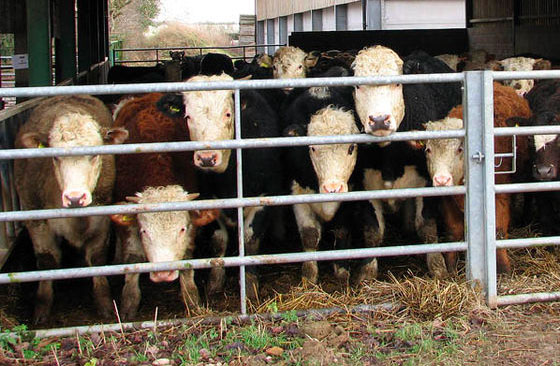
Plans to reduce farm animal health surveillances could put the health of cattle, sheep and pigs at risk, according to the Royal College of Pathologists.
The Department for Environment, Food and Rural Affairs' plan to down-size its network of laboratories and reduce animal post-mortems has drawn criticism from the College. They said diseases 'may be transmitted to humans' and cause damage to the livestock industry worth over £10 billion.
"Defra’s plans are not based on sound evidence and lack detail.
"Defra has failed to explain to the College how outsourcing tests to services outside its control will provide high-quality, effective testing. The College recommends that, until a more credible plan is in place, the present network of laboratories should be adequately resourced while alternative sources of funding and efficiency savings are sought. The College has offered to help Defra to design a new system including improved training in pathology," the Royal College said.
Dr Archie Prentice, President of The Royal College of Pathologists, said, "The current surveillance system is a success. It protects public and animal health and breeds confidence in a multi-billion pound livestock industry. The savings made in these proposed cuts are small compared to the health and financial risks they bring.
"If dismantled, the expertise, knowledge and trusted collaboration with farmers and veterinary surgeons could be lost. It is essential that any cost saving should not be at the expense of consumer safety, confidence in the livestock industry or animal welfare."
As well as the protection of animal welfare, animal disease surveillance is a key component in the detection of new and emerging risks that may have an effect on human health,
Dr Prentice added, "Prompt laboratory analysis was the pivotal component of the identification of Schmallenberg virus and laboratory diagnostics have improved greatly in the last decade. If current molecular and cellular pathology techniques were applied to a case of BSE (“mad cow disease”), confirmation that it was a transmissible spongiform encephalopathy could be confirmed within days.
"We should be looking for ways to sustain and improve expertise in veterinary pathology. In common with the majority of respondents to the Surveillance 2014 consultation, we fear the current proposals - which seem to be based on unfounded opinions and untested assumptions - are likely to damage it."
Dr Andrew Soldan, Head of the Surveillance 2014 project at AHVLA, said: “Several studies, including the independent Surveillance Advisory Group, have highlighted weaknesses within the current system.
“The changes will strengthen the ability to detect disease by placing greater emphasis on collecting data from a wider range of sources than simply post-mortems undertaken in government laboratories. Such intelligence exists within the private veterinary profession, the livestock industry and universities, but needs better collation and understanding.
“Far from losing skills, AHVLA will develop greater expertise in pathology and epidemiology, which the veterinary profession and livestock industry value so highly. Whilst the number of government post-mortem centres will reduce they will develop higher levels of expertise, and other providers of pathology will be added to the national network.”
